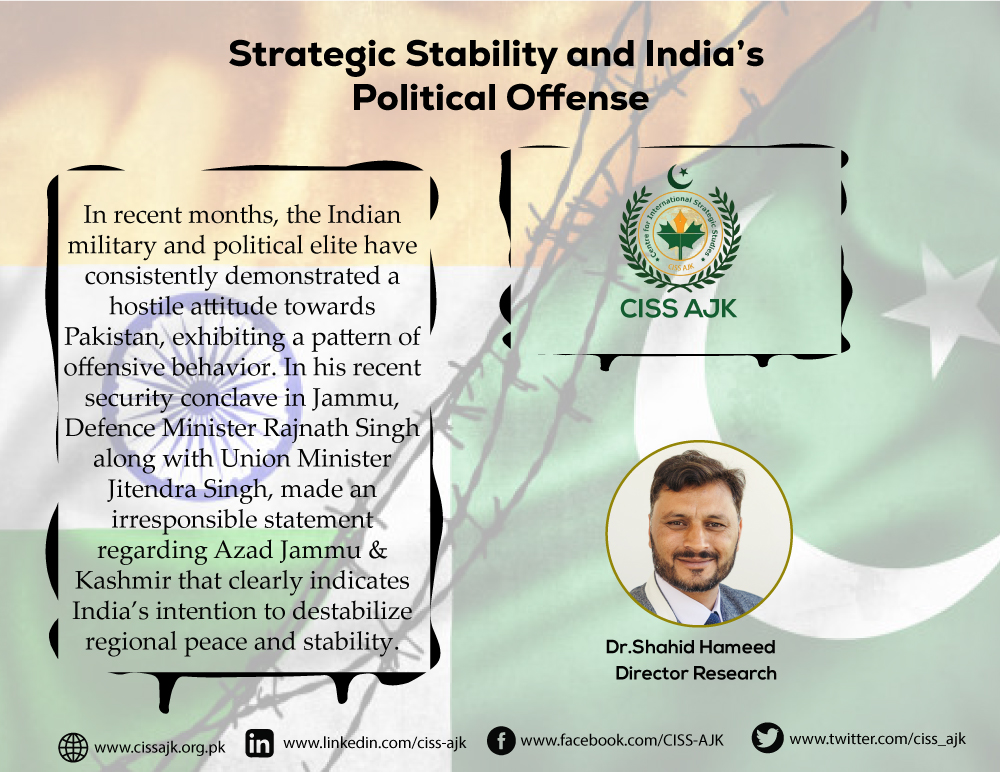646

In recent months, the Indian military and political elite have consistently demonstrated a hostile attitude towards Pakistan, exhibiting a pattern of offensive behavior. In his recent security conclave in Jammu, Defence Minister Rajnath Singh along with Union Minister Jitendra Singh, made an irresponsible statement regarding Azad Jammu & Kashmir that clearly indicates India’s intention to destabilize regional peace and stability. This pattern of statements in the Indian military and political leadership also indicates that India’s false flag and deceiving strategy will continue to distract global attention from his government’s illegal actions in Jammu & Kashmir.
The recent Indian rapprochement with the US has been projected in India as a game changer in Indian economic and political stature. On the flip side, Pakistan’s pragmatic and cautious approach in exposing India’s hidden motives behind their interactions with the West unsettled the BJP leadership. The very statement by Rajnath was also a part of India’s traditional deflecting policy to secure its own interests with the West. The BJP political leadership in India has continued this offensive demeanor for three major reasons.
First, Despite the revocation of special status of Jammu & Kashmir, India chose not to lift brutal laws, including the Armed Forces Special Powers Act (AFSPA). Pakistan exposed the real face of India that how New Delhi is using the propaganda of extremism against Pakistan “to deflect from the situation in Kashmir and the treatment of minorities in India”.The number of security forces has increased in different areas of occupied territory and events were organized under a military curfew. However, the failure to present a peaceful picture of the occupied region compelled policymakers in New Delhi to continue demonizing Pakistan. India is also facing serious territorial issues with China. There is no plausible countermeasure available to India to match China’s economic and diplomatic strength. Indian bluff to drag China in the G-20 Srinagar meeting failed badly. Infact, China’s boycott falsified any unilateral claims by India and globally highlighted the severity of the conflict in South Asia.
The second reason for contemporary Indian aggressive posture against Pakistan on diplomatic fronts is its perceived and desired global status. For certain reasons, the US adopted a preferential foreign policy approach with regard to India. Primarily, the purpose of this preferential policy is to contain the increasing economic, political, and military influence of China. On the other hand, Russian alienation through Indian departure from its influence shapes the duality of the same policy. However, India did not enjoy cordial relations with the US nor it has such level of working relationship. This generated perceptions and misperceptions in India about its global role and thus resulted in misleading self-positioning in world affairs. Historically, the US has been criticized by India to support freedom struggles for democracy around the world and the Kashmir freedom struggle is one of them.
The last reason for Indian recent political and diplomatic offense is Pakistan’s sharp responses to increasing violations of international borders as well as to the false flag operations. On Feb 27, 2019, Indian Air Force lost its fighter jets and pilots in aerial combat. A pilot was captured by Pakistan that exposed Indian vulnerabilities and exaggerated military superiority. The misadventures however continued and several other violations were made by the Indian army. The purpose of these intrusions was to signal to Pakistan that India is now changing its military doctrines.
Dr. Shahid Hameed is Director at Center for International Strategic Studies (CISS-AJK) Muzaffarabad.

